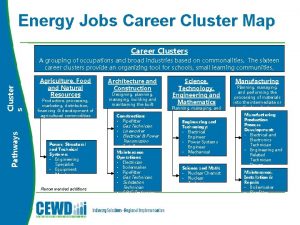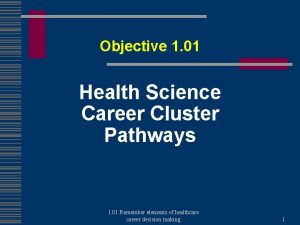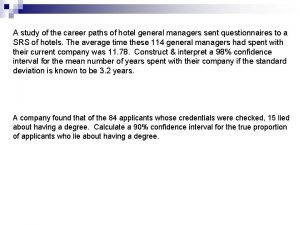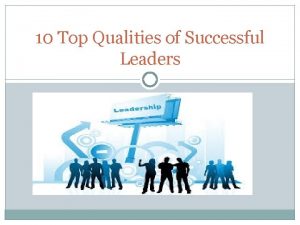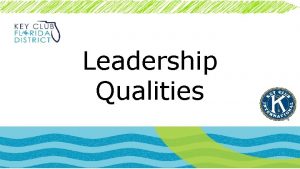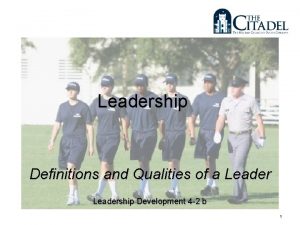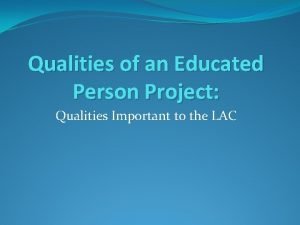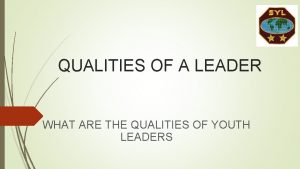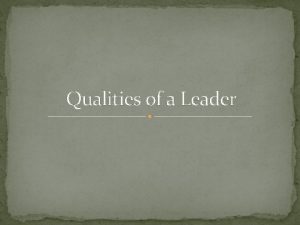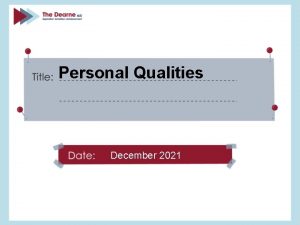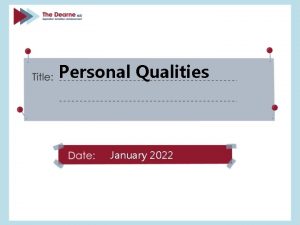Monday Morning Managers Leadership Qualities and Career Pathways





















- Slides: 21

Monday Morning Managers Leadership Qualities and Career Pathways: An Exploratory Study Paper Presented at the 27 th Annual Conference of the Network for Social Work Management June 17, 2016 Linda Helm, MSW, Ph. D Richard Boettcher, MSW, Ph. D This paper is a draft and not intended, in its present form, for duplication or publication. However, permission to cite or quote from its contents is freely given by the authors

Mixed Methods Study of the First 50 Monday Morning Managers Blog Purpose of Study To determine: • Preferred Leadership Qualities • Motivational Strategies • Career Paths to Management • Advice to Future Leaders • Paucity of research- Blog shines light on what social work managers do 2

Methodology • • Pilot Study Data Collection Form Separate Readings Collaboration Quantitative data entered into SPSS Qualitative data subjected to thematic analysis through collective comparison method • Collaborative Time= 15 + hours • Individual Time= 25 hours each 3

Quantitative Findings • Small sample of convenience (n=50) • Observations and hypotheses, Not hard conclusions • General findings Monday Morning Managers are: • • Likeable • Positive-minded • Affirming in their attitudes towards work and profession • Autobiographical essays are uplifting A cogent argument for why we need social workers to manage Human Service Organizations 4

Summary of Demographic and Descriptive Data (n=50) Gender Degrees M W Non. SW BSW Ph. D MSW + SW Non. SW Years in Mang. >10 4 -9 1 -3 Licensed? Yes Unk. 17 33 1 8 41 9 3 27 17 4 21 29 Current and Previous Positions in Human Service Organizations Current Previous Executive Director 17 14 Middle Manager 26 31 Frontline Supervisor 5 21 Staff Specialist 2 Clinician 0 37 5

Years in Management and Level of Current Position (n=50) Years in Management Current Position Level Front Line Supervision 1 -3 Years Middle Manager or Staff Specialist Executive Director f (%) f (%) Total 1 (20%) 5 (18%) 0 (0%) 6 4 -9 Years 4 (80%) 8 (29%) 5 (29%) 17 10+ Years 0 (0%) 15 (53%) 12 (71%) Totals 5 (100%) 28 (100%) 17 (100%) 50 27 6

Paths to Management Subjects Paths to Management (n=50) Frequency % Under Graduate or Graduate degree in Social Work Direct Service to First Management 33 66. 0 U/G or G degree Not in SW Direct Service to First Management 2 4. 0 UG or G degree in SW First Management 12 24. 0 Other Path 1 2. 0 Indeterminate 2 4. 0___ Total 50 100. 0 7

Favored Focus of Leadership Favored by Subjects (n=50) Frequency % Focus primarily on aspects of expressed Personality and/or Style 13 26. 0 • Passion, Project Vision, Creativity, Collaborative Style, Trustworthiness, Organized, Efficient Focus primarily on aspects of Organizational Culture, Structure or Process 10 20. 0 • Alliance Building, Staff development, Creating Shared Vision, Collaborative Decision Making and/or Problem Solving Both 26 52. 0 Unclassifiable 1 2. 0___ Total 50 100. 0 Mary Parker Follett 8

Favored Approaches to Motivating Staff Subjects Favored Approaches to Motivating Staff (n=50) Frequency % Primarily through Personal Interaction 6 12. 0 • Praise, Recognition, Brainstorming Collaboratively, Positive Affirmation Primarily through Structural Arrangements 15 30. 0 • Focus on Team to support each other, Focus on Individualized Professional Development, Empower staff to work independently, Create Monitoring and Communication Systems to Support Self-Motivation Both 25 50. 0 None: staff self motivates 3 6. 0 Unknown 1 2. 0___ Total 50 100. 0 9

Locus of Primary Mentors who Guided Subjects to Leadership Roles Locus of Primary Mentors Who Have Guided Subjects to Leadership Roles? (n=50) Frequency % Work Related Director or Supervisor 21 42 College Professor 4 8 College Field Instructor/Supervisor 1 2 Some Combination of Work and School 14 28 Other 4 8 Not Declared or indeterminate 6 12__ Total 50 100 10

Qualitative Findings WHAT ADVICE DO YOU HAVE FOR THOSE BEGINNING THEIR CAREER AND/OR WHAT DO YOU WISH YOU HAD KNOWN BEFORE YOU STARTED YOUR CAREER? Advice of a Personal Advice of a Professional Advice of an Nature Organizational Processes/Dynamics Nature The Character of the Leader Communication Internal Self-care and Development Leadership External Professional Development Skills and Knowledge Networking and Partnership 11

Inferred “BIG 5” Personality Traits Subjects Self-Identified “Big 5” Personality Traits, Directly or Inferred Percent of 50 Subjects Open: Seeks new experience Extraverted / Introverted Conscientiousness 96% (n=48) Impossible to Determine 58% (n=21) Emotional Stability Agreeable Impossible to Determine 64% (n=32) 12

Observations/ Hypotheses for Future Research • 18% of Monday Morning Managers report affiliation with proprietary agencies. Confirmed by other research. 13

Observations/ Hypotheses for Future Research • 66% of Monday Morning Managers report having direct practice employment before management. • 24% go directly into management 14

Observations/ Hypotheses for Future Research • 36% of Monday Morning Managers without direct practice experiences tend to favor an organizational approach to leadership • 60% of those with direct practice experience tend to favor BOTH (organizational and interpersonal) approaches to leadership 15

Observations/ Hypotheses for Future Research • Monday Morning Managers with and without Direct Practice experience favor using BOTH (personal interaction and organizational approaches) to motivate staff 16

Observations/ Hypotheses for Future Research • The workplace, not school, is the primary source of mentorship for Monday Morning Managers who came to leadership positions after significant direct practice experience (59%) • For those coming into leadership roles directly from school tend to identify mentors associated with schools 17

Observations/ Hypotheses for Future Research • The presence of three of the “BIG 5” personality characteristics was inferred from the Monday Morning Managers Blog Open Agreeable Conscientiousness 18

Observations/ Hypotheses for Future Research The Character of the Leader and are important to effective 19

Observations/ Hypotheses for Future Research Social Work Managers require: • non-profit management acumen including entrepreneurial skills • program development and evaluation knowledge • skill in managing interactions between their organizations and the larger systems of governance, financing, and collaborative problem solving 20

Thank You Any Comments, Questions, Thoughts? 21
 Megan caposell
Megan caposell Verizon career pathways
Verizon career pathways Jobs in health science career cluster
Jobs in health science career cluster 5 health care career pathways
5 health care career pathways Energy cluster jobs
Energy cluster jobs Quality career pathways
Quality career pathways Health science careers cluster
Health science careers cluster Wisconsin career pathways
Wisconsin career pathways A study of the career paths of hotel general managers
A study of the career paths of hotel general managers Monday morning prayer images
Monday morning prayer images Come monday morning
Come monday morning Good morning happy december
Good morning happy december Nehemiah leadership qualities
Nehemiah leadership qualities Was maya angelou a leader
Was maya angelou a leader Alibaba group simon xie
Alibaba group simon xie Joshua's leadership qualities
Joshua's leadership qualities Howard schultz leadership style
Howard schultz leadership style Howard schultz transformational leadership
Howard schultz transformational leadership Characteristics of student leaders
Characteristics of student leaders Dr asha menon
Dr asha menon Nehemiah leadership qualities
Nehemiah leadership qualities Qualities of a christian leader
Qualities of a christian leader




